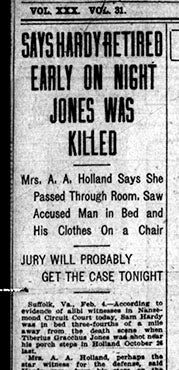The murder of Grac Jones: Chapter 12
Published 8:08 pm Friday, August 7, 2015
EDITOR’S NOTE: On the evening of Oct. 26, 1908, five shots rang out in the village of Holland. Tiberius Gracchus “Grac” Jones lay dying on the ground inside the gate leading to his home. “They have killed me and killed me for telling the truth,” he told a friend as his life ebbed away. This is the 12th in a series of articles about the Jones murder case. Suffolk historian Kermit Hobbs Jr. compiled the 18-part series from personal accounts, newspaper stories and court records he has studied from the period.
By Kermit Hobbs Jr.
Special to the News-Herald
Sam Hardy lived and boarded at the home of Mr. and Mrs. A.A. Holland at the corner of what is now Holland Road and Glen Haven Road. At that time, the Hollands had another boarder, Lon Whidbee, who was Mrs. Holland’s uncle. They also had an 18-year-old daughter, Mary.

Newspaper accounts from the time described Mrs. A.A. Holland as the “star witness” for the defense during the Nansemond County trial of Sam Hardy in the murder of Tiberius “Grac” Jones in 1908.
The Holland home was located about three-quarters of a mile from the home of Grac Jones. Jones had been shot at 10:30 p.m. on the evening in question.
The defense team called three key witnesses to prove Sam Hardy was at home in his bed at the time of the murder. These were Mr. and Mrs. Holland and Mr. Whidbee.
Everett Holland, Mary’s young suitor, had visited the home on the evening of the murder but offered little useful information. Mary was ill at the time of the trial and was unable to come and testify before the court.
The three key witnesses were called to testify, and they presented the facts as they recalled them. They were consistent in their accounts of what had happened that evening.
On the evening of Oct. 26, 1908, Everett Holland had come at 7:30 p.m. to visit the Hollands’ daughter, Mary. Mr. and Mrs. Holland had left the young couple visiting in the parlor while they went upstairs to Sam Hardy’s room, where she kept the sewing machine.
Sam Hardy had come home at 8:40 p.m. from his store, complaining of feeling sick. He took a dose of calomel, and the Hollands had left the room so he could go straight to bed.
The Hollands retired to Mrs. Holland’s room, which adjoined Hardy’s room, and the door between them was left slightly ajar. At some point, Whidbee joined the Hollands.
Everett Holland left at 9:45 p.m., and Mary came up to bed in her room at 10 p.m. Fifteen minutes later, Mr. Holland and Whidbee left to go out to Mr. Holland’s office building behind the house. Mr. Holland had been sleeping there during the past few months to look after the elderly Whidbee.
On the way out, they passed through Hardy’s bedroom, because it was the shorter way to get to the stairs. As they passed, they said, they saw Hardy in the bed. None of the witnesses could say for certain that it was Hardy or that it was, in fact, a man in the bed.
Before she retired at 10:45, Mrs. Holland looked in and saw the form of the man, presumably Sam Hardy, in the bed. She had planned a trip to Norfolk the next morning, and she was going around the house checking to make sure everything was in order for her to be gone for the day. She, like the two men earlier, could not say for sure that it was Hardy in the bed.
Of the witnesses, Mrs. Holland was the strongest. During cross examination, the prosecuting attorney, Col. Cabell, grilled her mercilessly, asking essentially the same questions repeatedly from differing perspectives. He was particularly suspicious of the consistency of the testimony of the three witnesses and the certainty of their memory. Here is a typical exchange:
Cabell: You can remember everything in order to locate Hardy that night and keep him away from the scene of their murder, but the following day you can’t remember whether the man came to dinner or not, or whether you spoke to him?
Mrs. Holland: It was not a habit. It was not a regular thing.
Cabell: You are speaking of possibilities. This is a time when we have to be positive.
Mrs. Holland: Yes, I know that, and I am telling the truth, too.
Cabell: Please tell the jury why you can speak so emphatically and positively of the very minutes that occurred on Monday night, and on Tuesday, the day following, you can’t even tell whether your husband and Whidbee and Sam Hardy ate breakfast together, or whether Sam Hardy took dinner at your house?
Mrs. Holland: I don’t think that they came in. If they did, they might have come in before Mr. Hardy finished.
Mrs. Holland’s performance earned the admiration of the Norfolk Ledger-Dispatch with the next afternoon’s headline, “Mrs. A.A. Holland, On the Stand for Two Hours, Made a Splendid Witness.”
TOMORROW: The trial — closing arguments





